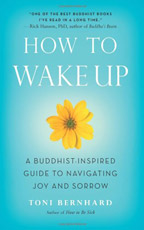Toni Bernhard is the acclaimed author of How To Be Sick: A Buddhist-Inspired Guide for the Chronically Ill and Their Caregivers which made S&P's Best Spiritual Books of 2010 list. She fell ill on a trip to Paris in 2001 with what the doctors initially diagnosed as an acute viral infection. She has not recovered and has become a regular contributor to Psychology Today online. Bernard has been studying and practicing Buddhism since 1992. She can be reached at www.tonibernhard.com.
In How to Wake Up, the author explains the practices we can do to make the best possible use of suffering and setbacks through the cultivation of wisdom, mindfulness, and open-heartedness. Without clinging to joy or resisting sorrow, we can walk in the path laid out by the Buddha that leads to peace and well-being.
The first thing Bernhard wants us to know is that nothing lasts forever — everything is impermanent. Second, there is no fixed-self. Third, we are all living with suffering and pain: there is no way out of this condition. We must deal with the five habits of mind that are obstacles to waking up: desire for sense pleasure, anger or ill-will, torpor or lethargy, restlessness or worry, and skeptical doubt. As antidotes to these toxins, Bernhard presents tools for sharpening your mindfulness skills, choiceless awareness, and death awareness.
Life is further enriched by practicing not only kindness and friendliness but compassion (tonglen) for others and for oneself. Bernard quotes Lama Yeshe who has said: "If you expect your life to be up and down, your mind will be much more peaceful." This is possible through the practice of equanimity.
How to Wake Up contains plenty of practices designed to help you stay afloat on the tempestuous seas of suffering, loss, setback, or disappointment.
